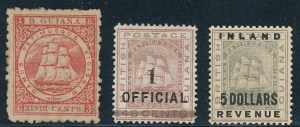The greatest impediment to a smaller country’s philatelic popularity is rarities. Collectors, when they move outside the philately of their home country, want attractive stamps and they want a collection that is completable for a reasonable expenditure of time and money. British Guiana has always had this philatelic cross to bear. The stamps are interesting, well designed and hard to find. But the rarest stamp in the world, the one cent magenta, is from British Guiana as are the Cotton Reels and the first page in the British Guiana specialty album would cost you about $2 million to complete- even if you could get the British Guiana out of the estate of John DuPont, who died in prison in 2010 after murdering a wrestler on his property in 1997. British Guiana was originally settled by the Dutch and would be included in the philately of Netherlands Antilles if the Dutch hadn’t ceded sovereignty to the British during the Napoleonic wars. For years, British Guiana was in essence a huge sugar plantation, exporting sugar, molasses and its derivative product-rum. In 1815 the colony had perhaps the highest ratio of slaves to Europeans in the world with 77,000 slaves and 2500 white Europeans. The colony had one of the largest and most successful slave uprisings in 1823. The stamps of British Guiana are among the most attractive in the world and are different from nearly all other British colonial issues in that Queen Victoria appears on none of their stamps. Perhaps this is because of the Dutch heritage of British Guiana. The stamps, except for the first page, are affordable though very difficult to find. This country would be a great area for a collector looking for a challenge.



